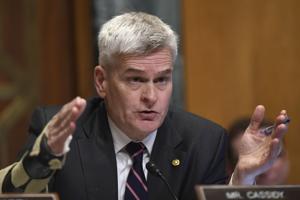Cassidy fields criticism after $1.2T infrastructure bill passes U.S. Senate

(The Center Square) – Rather than taking a victory lap, Louisiana U.S. Sen. Bill Cassidy has had to defend his efforts in helping pass a $1.2 trillion infrastructure bill in the U.S. Senate.
Louisiana could receive $6 billion for roads and highways over five years, along with hundreds of millions of dollars in related projects, such as water ports, airports and river dredging, if the bill passes the U.S. House and is signed by President Joe Biden.
Residents also could benefit from a $4.5 billion national allotment for coastal resiliency and $3.5 billion for flood mitigation.
“There’s an orange cone coming to a city near you,” Cassidy told viewers Tuesday on Facebook Live after the U.S. Senate passed the spending package.
The vast majority of town hall respondents, however, were unimpressed. Chief among their concerns was whether a separate $3.5 trillion Democratic spending package will be paired with the infrastructure legislation now that the bill goes to the U.S House.
“Absolutely not,” Cassidy said. “The Senate Majority Leader, Mitch McConnell, voted for the $1.2 trillion infrastructure bill. Now, you may not like Mitch, you may not trust Mitch, but there is no better analyst of how to achieve Republican goals in Congress than Mitch McConnell.”
Cassidy explained that infrastructure spending was a congressional priority and that splitting it from the multitrillion-dollar Democratic spending proposal was the best option for his constituents.
“Breaking them apart was the strategy to make the $3.5 trillion bill less likely,” he said. “I hate that bill, but I love our infrastructure bill.”
Some town hall respondents presented spending items they didn’t agree with: “Why are we spending money on Amtrak when most people don’t use Amtrak?” a questioner asked in reference to the $66 billion Amtrak allotment.
“This is a bill for the entire country,” Cassidy said. “You might ask why we’re spending $4.5 billion on coastal restoration for areas recently hit by natural disasters.”
Questions about overspending, inflation, environmental regulations, increased building costs and electric vehicles also were presented. Cassidy acknowledged the inclusion of items he did not like but chalked them up to “tradeoffs.”
“For example, $7.5 billion for electric vehicle charging stations,” he said. “The president said he wasn’t going to sign the bill unless that was addressed.”
John Kennedy, Louisiana’s other Republican U.S. senator, expressed outspoken opposition.
“If you look up ‘stupid stuff’ in the dictionary, there’s a picture of the $1.2 TRILLION bill,” Kennedy tweeted. “Under this bill, Louisiana would have to pay roughly $1.3 BILLION in new taxes on an industry (oil and gas) that supports 100,000 jobs in our state.”
Kennedy, who serves on the Senate Budget Committee and the Committee on Appropriations, said he was a likely “yes” until he received the actual bill text.
“They told us it was a real infrastructure bill. It’s not. Only 23% of the bill is real infrastructure, the rest is Green New Deal and welfare. They told us it’s paid for. It’s isn’t. We’re going to have to borrow up to $400 billion to pay for it,” he said.
Cassidy was a lead negotiator in a group of 20 bipartisan senators who reached an agreement in principle last month. On Tuesday, he was one of 19 Republican senators who voted in favor of the legislation, which passed 69-30. Every Senate Democrat voted for it.
When asked about accountability and making sure enormous sums would be spent as intended, Cassidy said, “We audit.”
“When I say ‘we,’ I mean you and me: the federal taxpayer,” he said. “We audit to see if states and locals do it right. If they don’t, they have to return the money.”
According to the bill framework, federal infrastructure dollars are sent to states and states divide the funding into approved spending areas and local government allotments.
Louisiana Gov. John Bel Edwards, a Democrat, praised the bill’s passage, saying it will provide “an everlasting impact on Louisiana,” in a news release.
“We are that much closer to receiving nearly $6 billion from the nationwide allocation of $550 billion,” Edwards said. “I am grateful to Sen. Bill Cassidy for his leadership on the Infrastructure Investment and Jobs Act which will bring benefits to our state for generations to come.”
Disclaimer: This content is distributed by The Center Square

